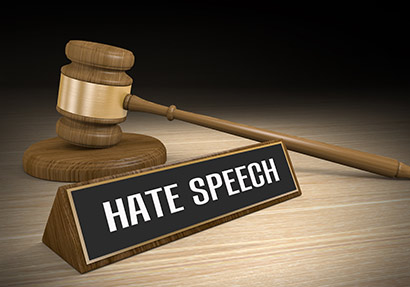LGBTI groups against hate speech provision in hate crimes bill
 A number of LGBTI+ groups don’t believe that the hate crimes bill’s attempt to make hate speech a criminal offence is a good idea – and it’s probably unconstitutional.
A number of LGBTI+ groups don’t believe that the hate crimes bill’s attempt to make hate speech a criminal offence is a good idea – and it’s probably unconstitutional.
Late last year, the Department of Justice and Constitutional Development released the draft Prevention and Combating of Hate Crimes and Hate Speech Bill.
While rightly proposing to recognise the hate motivation behind hate crimes and allowing judges to act on this as an aggravating factor – which has been generally applauded by LGBTI+ groups – it also aims to criminalise hate speech, with a fine or imprisonment for up to three years for a first offender.
It is this second provision that has proven to be most controversial. It has not been widely welcomed, neither by conservative religious groups (who say it’ll limit their ability to preach against homosexuality), nor by LGBTI+ and other human rights organisations.
The bill proposes that hate speech be defined as “any communication whatsoever” that “advocates hatred towards any other person or group of persons; or is threatening, abusive or insulting towards any other person or group of persons” on various grounds, including sexual orientation and gender.
This communication must demonstrate a clear intention to “incite others to harm any person or group of persons, whether or not such person or group of persons is harmed” or “stir up violence against, or bring into contempt or ridicule, any person or group of persons”.
The crime includes the distribution in any way, including electronically (such as through social media), of the hate speech communication or material.
In its submission to government about the bill (the deadline was 31 January), the Hate Crimes Working Group (HCWG) said that “after much contemplation, debate, and discussion, the HCWG has come to the conclusion that it cannot in any way support the criminalisation of hate speech as contemplated…”
The HCWG is led by a committee consisting of: Amnesty International (South Africa); Durban LGBTI Community and Health Centre; Gender Dynamix; Lawyers for Human Rights; Psychological Society of South Africa; Scalabrini Centre; Sex Worker Education and Advocacy Task Force; Sonke Gender justice; South African Jewish Board of Deputies; and Triangle Project.
The organisation explained that it cannot back the criminalisation of hate speech as envisaged in the bill for “practical, ideological, legal, and constitutional considerations”.
“We believe that the provision will lead to serious unintended consequences for the very people the provision is intended to protect,” said the HCWG.
It further commented that there are already provisions under the law that address hate speech and that these should instead be strengthened. These include the criminal charge of crimen injuria, and the Promotion of Equality and Prevention of Unfair Discrimination Act (Equality Act) through the Equality Courts, amongst others.
“We do not support the creation of a new mechanism to deal with hate speech, where existing mechanisms have not been adequately strengthened, used, and publicised,” argued the HCWG.
Cape Town based LGBTI+ group Triangle Project added in a statement: “It is our belief that hate speech which does not incite violence, is best addressed outside of the criminal justice system. The existing remedies are available to everyone in our country, and we encourage people to use them to defend their rights.”
Lerato Phalakatshela, Hate Crimes Manager at OUT and Spokesperson for the Love Not Hate campaign, told Mambaonline that he also believes that the inclusion of hate speech in the bill was not necessary.
“The sentencing is also too harsh and doesn’t really focus on rehabilitating the offender and only focuses on punishing. It should be more about learning from the experience,” he said.
Constitutional expert Pierre de Vos wrote in an article that the hate speech provision of the bill “is almost certainly overbroad and hence unconstitutional” by infringing on the right to free speech.
He especially pointed out the bill’s “sweeping” criminalisation of the intention to “bring into contempt or to ridicule another person”. This could, he said, have the “potentially absurd consequences of criminalising a large chunk of what currently goes for banter or political argument on social media”.
De Vos further noted that the bill’s hate speech provision makes no distinction between a “‘victim’ with social and economic power and one without,” which “could be used by the privileged and the powerful to silence those who speak up about injustice and oppression”.
The move to include hate speech in the hate crime bill – in the wake of Penny Sparrow type incidents – was never a good idea (and the government was advised against this). As various groups and commentators have made clear, it brings complex constitutional issues into play. Issues that may well delay and complicate the process of making the much-needed legal recognition of hate crimes a reality.
To read the draft Prevention and Combating of Hate Crimes and Hate Speech Bill, click here.
Leave a Reply